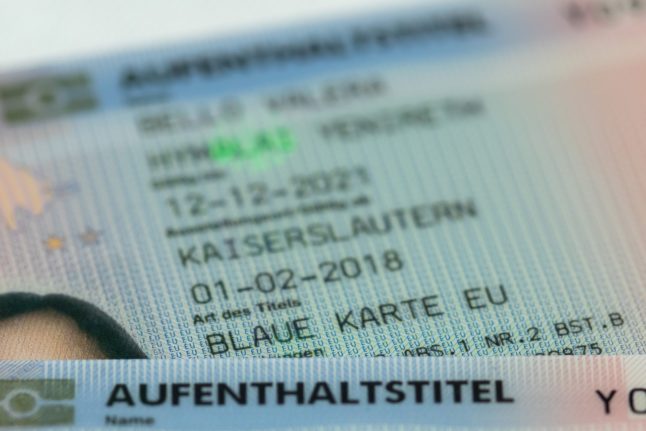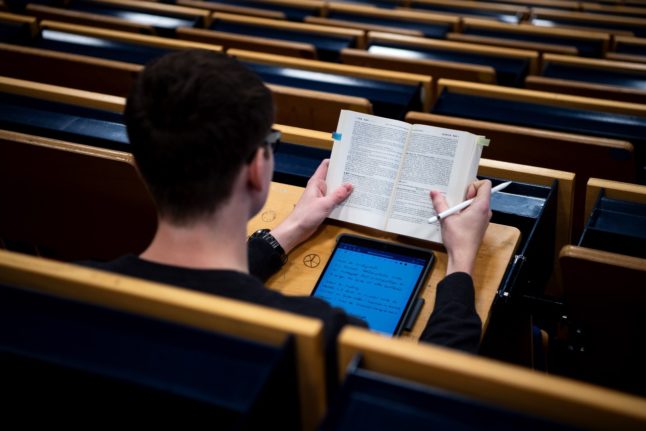KEY POINTS: What's in Germany's new draft law on skilled immigration?

A new draft law has set out how Germany plans to plug its skills cap by rejigging its immigration laws. Here are the main points to know about.
When the Social Democrats (SPD), Greens and Free Democrats (FDP) came together to try and build a new coalition back in the autumn of 2021, there was very little that the three parties agreed on more than immigration.
While the negotiators thrashed out compromise positions on things like tax, transport, climate protection and welfare, bringing more skilled workers into Germany was a shared goal across the political spectrum. The question, since then, has been how.
In a new draft law released by Federal Interior Ministry and Ministry for Labour and Social Affairs on Monday, the government has set out its plans for a wide-scale reform of the immigration system.
The new framework could drastically relax rules on things recognition of qualifications and the criteria for obtaining a blue card, as well as making it more attractive for international students to come to Germany.
The aim is to pave the way for a new generation of migrant workers in Germany who will boost the economy and pay into the social system.
Why is Germany so desperate for workers?
Put bluntly, Germany is woefully short-staffed in almost every area of the economy. From Kitas and hospitals to building sites and tech firms, the country needs workers to keep society running - but almost every sector is suffering from a skills gap.
According to the Ifo economics institute in Munich, almost half of all German companies were affected by staff shortages last year. In fact, experts estimate that around 400,000 new workers are needed in the country each year to compensate for the current shortfall.
READ ALSO: Foreign workers filled over two-thirds of new jobs in Germany in 2022
Discussing the release of the new draft law, Interior Minister Nancy Faesar (SPD) said removing bureaucratic hurdles to immigration was "urgently needed", adding that staffing issues had been exacerbated by the Covid pandemic.
Meanwhile, Labour Minister Hubertus Heil (SPD) said the country was competing for "clever minds and helping hands" within an international labour market.
"Our economic prosperity is also determined by our answers to securing skilled labour," Heil said in a statement announcing the release of the new draft law. "That is why we are focusing on more education and training, more women in employment and flexible transitions into retirement.
"But we need additional immigration from abroad to have enough skilled workers in the country. With the new Skilled Workers Immigration Act, we are taking the necessary step forward."

Labour Minister Hubertus Heil unveils the Bürgergeld plans on Wednesday. Photo: picture alliance/dpa | Christoph Soeder
OK, so what's on the agenda?
With the Skilled Immigration Act, the government's key goal is to increase the number of workers coming to Germany by around 65,000 per year.
To do this, it plans to build on previous legislation targeting skilled workers and construct a labour immigration policy based on three pillars: the skilled labour pillar, the work experience pillar, and the 'potential' pillar.
This means that, as well as looking at formal qualifications like university degrees, future job offers and work permits could also be granted to people with experience in a certain field or the potential to contribute to the German labour market in a positive way.
READ ALSO: ‘More jobs in English’: How Germany could attract international workers
Here are the key changes the government is hoping to bring in:
Loosening Blue Card rules
The EU's Blue Card scheme is one of the best routes for skilled workers from a non-EU country to live and work in a member state - and the government is hoping to make it a lot more flexible.
For a start, the draft sets out proposals to lower the salary thresholds that are required for people to be eligible for a Blue Card, so lower earning potential won't necessarily make it impossible to get this type of visa. This particularly applies to people with a university degree who just starting out in their career and can't immediately demand a sky-high salary.

Two Blue Cards for foreign skilled workers are on a table at the Federal Office for Migration and Refugees in Bavaria. Photo: picture alliance/dpa | Daniel Karmann
In addition, the rules for IT professionals will be relaxed so that people with career experience or skills can be accepted for a Blue Card without a university degree.
Once people have a Blue Card, they should also be able to change job more easily and also benefit from more clear-cut rules for moving between different member states.
Finally, the draft states that "beneficiaries of international protection" - i.e. refugees - who have been granted asylum in an EU country should also be able to get a Blue Card in Germany.
Rolling out a new jobseeker's visa
A key change to Germany's immigration law will be the introduction of the so-called 'Chancenkarte', or 'Opportunity Card', for people who want to look for a job in Germany.
As it stands, working visas are only granted to people with existing job offers, but the Opportunity Card will allow people to come to Germany for up to a year in order to look for work - provided they can sustain themselves during this time.
Crucially, these permits will distributed to people with at least two years' of higher education who earn enough points in the following categories, among others:
- Age
- Connection to Germany
- Work experience
- Language skills
People with an Opportunity Card can not only take on part-time and temporary work, but they can also change the purpose of their stay in Germany at any time, for example by switching to a work visa or opting to undergo further training or study instead.
"This increases flexibility and thus also the attractiveness of coming to Germany," the draft states.
READ ALSO: Explained: How to apply for Germany’s new ‘opportunity card’ and other visas for job seekers
Making life easier for international students
The traffic-light coalition is also setting its sights on foreign students as a way to encourage a new skilled workforce into the country.
In the draft law, it sets out plans to make studying in the country more feasible for people, which includes relaxing the rules around working as a student.
That means that international students could in future have far more opportunities for earning money alongside their degree and may also be able to work more hours in order to make ends meet. In addition, the government says it wants to offer more flexibility to do other types of training alongside formal qualifications, for example by allowing students to take language courses alongside their studies.

A student takes notes on their reading material in a lecture hall in Bremen. Photo: picture alliance/dpa | Sina Schuldt
Recognition of foreign qualifications
Another significant change will be the way Germany handles foreign, non-EU qualifications. At present, many professionals from abroad require official recognition of their qualifications in Germany - an arduous process that is handled differently in every federal state. That means that if you move from Baden-Württemberg to Bavaria, for example, you often have the start the process all over again.
In future, the government wants to scrap this formal requirement for people with high potential or who bring a significant level of professional experience with them. In these cases, foreign qualifications will be accepted as they are, provided the employer meets a certain salary threshold or is covered by a collective agreement to ensure fair working conditions.
READ ALSO: EXPLAINED: How Germany plans to make immigration easier for skilled workers
In other cases, people will be able to start the process of getting their qualifications recognised after they enter the country. This means they can start living, working and earning money in Germany while the bureaucratic stuff is being dealt with, rather than having to wait.
Comments
See Also
When the Social Democrats (SPD), Greens and Free Democrats (FDP) came together to try and build a new coalition back in the autumn of 2021, there was very little that the three parties agreed on more than immigration.
While the negotiators thrashed out compromise positions on things like tax, transport, climate protection and welfare, bringing more skilled workers into Germany was a shared goal across the political spectrum. The question, since then, has been how.
In a new draft law released by Federal Interior Ministry and Ministry for Labour and Social Affairs on Monday, the government has set out its plans for a wide-scale reform of the immigration system.
The new framework could drastically relax rules on things recognition of qualifications and the criteria for obtaining a blue card, as well as making it more attractive for international students to come to Germany.
The aim is to pave the way for a new generation of migrant workers in Germany who will boost the economy and pay into the social system.
Why is Germany so desperate for workers?
Put bluntly, Germany is woefully short-staffed in almost every area of the economy. From Kitas and hospitals to building sites and tech firms, the country needs workers to keep society running - but almost every sector is suffering from a skills gap.
According to the Ifo economics institute in Munich, almost half of all German companies were affected by staff shortages last year. In fact, experts estimate that around 400,000 new workers are needed in the country each year to compensate for the current shortfall.
READ ALSO: Foreign workers filled over two-thirds of new jobs in Germany in 2022
Discussing the release of the new draft law, Interior Minister Nancy Faesar (SPD) said removing bureaucratic hurdles to immigration was "urgently needed", adding that staffing issues had been exacerbated by the Covid pandemic.
Meanwhile, Labour Minister Hubertus Heil (SPD) said the country was competing for "clever minds and helping hands" within an international labour market.
"Our economic prosperity is also determined by our answers to securing skilled labour," Heil said in a statement announcing the release of the new draft law. "That is why we are focusing on more education and training, more women in employment and flexible transitions into retirement.
"But we need additional immigration from abroad to have enough skilled workers in the country. With the new Skilled Workers Immigration Act, we are taking the necessary step forward."

OK, so what's on the agenda?
With the Skilled Immigration Act, the government's key goal is to increase the number of workers coming to Germany by around 65,000 per year.
To do this, it plans to build on previous legislation targeting skilled workers and construct a labour immigration policy based on three pillars: the skilled labour pillar, the work experience pillar, and the 'potential' pillar.
This means that, as well as looking at formal qualifications like university degrees, future job offers and work permits could also be granted to people with experience in a certain field or the potential to contribute to the German labour market in a positive way.
READ ALSO: ‘More jobs in English’: How Germany could attract international workers
Here are the key changes the government is hoping to bring in:
Loosening Blue Card rules
The EU's Blue Card scheme is one of the best routes for skilled workers from a non-EU country to live and work in a member state - and the government is hoping to make it a lot more flexible.
For a start, the draft sets out proposals to lower the salary thresholds that are required for people to be eligible for a Blue Card, so lower earning potential won't necessarily make it impossible to get this type of visa. This particularly applies to people with a university degree who just starting out in their career and can't immediately demand a sky-high salary.

In addition, the rules for IT professionals will be relaxed so that people with career experience or skills can be accepted for a Blue Card without a university degree.
Once people have a Blue Card, they should also be able to change job more easily and also benefit from more clear-cut rules for moving between different member states.
Finally, the draft states that "beneficiaries of international protection" - i.e. refugees - who have been granted asylum in an EU country should also be able to get a Blue Card in Germany.
Rolling out a new jobseeker's visa
A key change to Germany's immigration law will be the introduction of the so-called 'Chancenkarte', or 'Opportunity Card', for people who want to look for a job in Germany.
As it stands, working visas are only granted to people with existing job offers, but the Opportunity Card will allow people to come to Germany for up to a year in order to look for work - provided they can sustain themselves during this time.
Crucially, these permits will distributed to people with at least two years' of higher education who earn enough points in the following categories, among others:
- Age
- Connection to Germany
- Work experience
- Language skills
People with an Opportunity Card can not only take on part-time and temporary work, but they can also change the purpose of their stay in Germany at any time, for example by switching to a work visa or opting to undergo further training or study instead.
"This increases flexibility and thus also the attractiveness of coming to Germany," the draft states.
READ ALSO: Explained: How to apply for Germany’s new ‘opportunity card’ and other visas for job seekers
Making life easier for international students
The traffic-light coalition is also setting its sights on foreign students as a way to encourage a new skilled workforce into the country.
In the draft law, it sets out plans to make studying in the country more feasible for people, which includes relaxing the rules around working as a student.
That means that international students could in future have far more opportunities for earning money alongside their degree and may also be able to work more hours in order to make ends meet. In addition, the government says it wants to offer more flexibility to do other types of training alongside formal qualifications, for example by allowing students to take language courses alongside their studies.

Recognition of foreign qualifications
Another significant change will be the way Germany handles foreign, non-EU qualifications. At present, many professionals from abroad require official recognition of their qualifications in Germany - an arduous process that is handled differently in every federal state. That means that if you move from Baden-Württemberg to Bavaria, for example, you often have the start the process all over again.
In future, the government wants to scrap this formal requirement for people with high potential or who bring a significant level of professional experience with them. In these cases, foreign qualifications will be accepted as they are, provided the employer meets a certain salary threshold or is covered by a collective agreement to ensure fair working conditions.
READ ALSO: EXPLAINED: How Germany plans to make immigration easier for skilled workers
In other cases, people will be able to start the process of getting their qualifications recognised after they enter the country. This means they can start living, working and earning money in Germany while the bureaucratic stuff is being dealt with, rather than having to wait.
Join the conversation in our comments section below. Share your own views and experience and if you have a question or suggestion for our journalists then email us at [email protected].
Please keep comments civil, constructive and on topic – and make sure to read our terms of use before getting involved.
Please log in here to leave a comment.